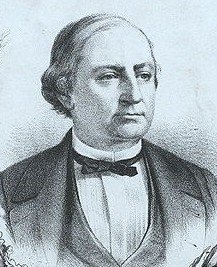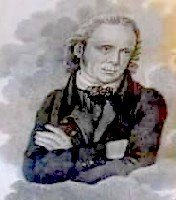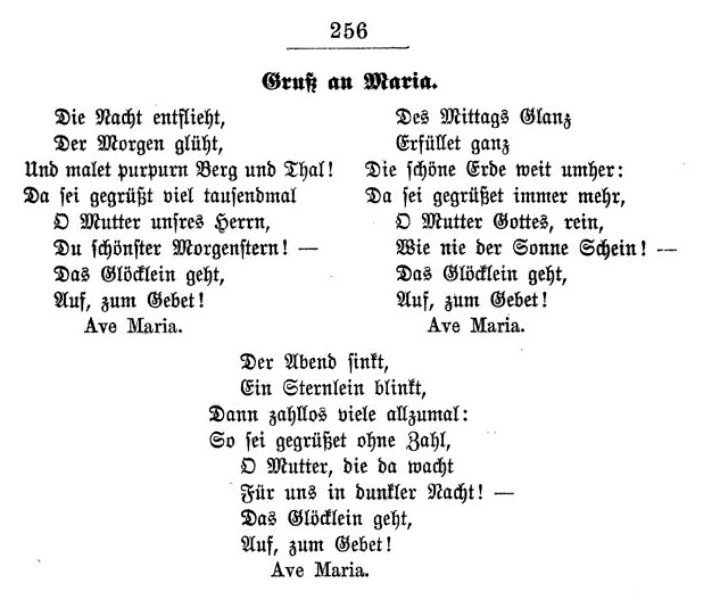Abt, Franz - Gruß an Maria - Op.62 No.5
 Duet for 2 voices + piano
Duet for 2 voices + piano
year of composition / 1st publication: 1848
 |  | Composer: Franz Abt (1819-1885) aliases, aka: Franz Wilhelm Abt Country of origin / activity: Germany | |
| Text author: Wilhelm Smets (1796 - 1848) aka: né Philipp Karl Joseph Anton Johann Wilhelm Smets von Ehrenstein; aliases: Lenz von Prag; Justus Walter; Wilhelm von Reval Country of origin / activity: Germany | |||
| Arranger / Editor: N/A |
Similar names or titles
| MIDI | MP3 | VID | First name | Last name | Birth | Death | comp | ID # | Title | Voicing | Instrumentation | |
|---|---|---|---|---|---|---|---|---|---|---|---|---|
| 0 | 0 | 0 | 0 | Franz Wilhelm | Abt | 1819 | 1885 | 1848 | Op.62/5 | Gruß an Maria - Die Nacht entflieht | duet 2vv. | piano |
| 0 | 0 | 0 | 0 | Franz Wilhelm | Abt | 1819 | 1885 | 1852 | Op.96 | Ave Maria | Soprano | piano |
| 0 | 0 | 0 | 0 | Franz Wilhelm | Abt | 1819 | 1885 | 1854 | Op.128/2 | Ave Maria | Alto | piano |
| 1 | 1 | 0 | 0 | Franz Wilhelm | Abt | 1819 | 1885 | 1860 | - | La Prière au Cloître | solo voice | piano |
| 1 | 1 | 0 | 0 | Franz Wilhelm | Abt | 1819 | 1885 | 1860 | - | Ave Maria | solo voice | piano |
| 1 | 1 | 0 | 0 | Franz Wilhelm | Abt | 1819 | 1885 | 1861 | Op.192/1 | Ave Maria - Leis' sinkt der Dämm'rung Schleier | tenor solo + TTBB choir | a cappella |
| 0 | 0 | 0 | 0 | Franz Wilhelm | Abt | 1819 | 1885 | 1867 | Op.328/2 | Ave Maria | MSopr. or Alto | |
| 0 | 0 | 0 | 0 | Franz Wilhelm | Abt | 1819 | 1885 | 1868 | Op.346/2 | Das Ave Maria in den Alpen | TTBB choir | a cappella |
| 0 | 0 | 0 | 0 | Franz Wilhelm | Abt | 1819 | 1885 | 1871 | Op.409-1/1 | Ave Maria | V (2) | pf |
| 0 | 0 | 0 | 0 | Franz Wilhelm | Abt | 1819 | 1885 | 1872 | Op.411-1/1 | Ave Maria - Leise sinkt der Dämm'rung Schleier | 3-st. Frauenchor | Pfte |
| 1 | 1 | 1 | 1 | Franz Wilhelm | Abt | 1819 | 1885 | 1874 | Op.433 | Ave Maria (Gruß dir, Maria) | Sopr. solo | pf |
| 0 | 0 | 0 | 0 | Franz Wilhelm | Abt | 1819 | 1885 | 1876 | Op.437-2/1 | Ave Maria (Abendfeier) Nun ist der laute Tag verhallt | solo voice | piano |
| 1 | 1 | 0 | 0 | Franz Wilhelm | Abt | 1819 | 1885 | 1874 | Op.438 | Ave Maria | SATB | Harmonium or organ |
| 1 | 1 | 0 | 0 | Franz Wilhelm | Abt | 1819 | 1885 | 1906 | Op.438 arr. | Ave Maria | NV | organ |
| 0 | 0 | 1 | 1 | Franz Wilhelm | Abt | 1819 | 1885 | 1876 | Op.533/3 | Ave Maria - Nun ist der laute Tag verhallt | T+B solos + TTBB choir | a cappella |
| 0 | 0 | 0 | 0 | Franz Wilhelm | Abt | 1819 | 1885 | 1878 | Op.540-1/2 | Ave Maria - Leis' sinkt der Dämm'rung Schleier | 2vv, 1 or 4 vv ad lib | pf |
"Gruß an Maria", no. 5 in Op.62 6 zweistimmige Lieder mit Begleitung des Pianoforte, [duet for 2 voices with piano]
published 1848, Offenbach, André
Available documentation:
Recording:| not available | CD: |
Lyrics: source page
| Die Nacht entflieht, Der Morgen glüht Und malet purpurn Berg und Tal; Da sei gegrüsst viel tausendmal, O Mutter uns'res Herrn, Du schönster Morgenstern! Das Glöcklein geht. Auf, zum Gebet! Ave Maria! | Des Mittags Glanz Erfüllet ganz Die schöne Erde weit umher; Da sei gegrüsset immermehr, O Mutter Gottes, rein Wie nie der Sonne Schein! Das Glöcklein geht. Auf, zum Gebet! Ave Maria! | Der Abend sinkt, Ein Sternlein blinkt, Dann zahllos viele allzumal; Da sei gegrüsset ohne Zahl, O Mutter, die da wacht, Für uns in dunkler Nacht! Das Glöcklein geht. Auf, zum Gebet! Ave Maria! |
| MIDI: not available | MP3: not available |
Score:
| not available | |
| My thanks and appreciation to ... for sending me this score. | |
Video - posted on YouTube:
| not available at this time | YOU could be featured here! If you or your choir perform this Ave Maria, make a video recording. Post your video on YouTube, email me the page URL and I'll embed the video in this page. |
Internet references, biography information: Franz Wilhelm Abt
| http://en.wikipedia.org/wiki/Franz_Abt | |
| From Wikipedia, the free encyclopedia Franz Wilhelm Abt (22 December 1819 – 31 March 1885)[1] was a German composer and choral conductor.[2] He composed roughly 3,000 individual works mostly in the area of vocal music. Several of his songs were at one time universally sung, and have obtained a more or less permanent place in the popular repertory. During his lifetime, Abt was a renowned choral conductor and he spent much of the last three decades of his life working as a guest conductor with choirs throughout Europe and in the United States. Biography Abt was born at Eilenburg in Prussian Saxony, and showed musical talent at an early age. His father was a clergyman and a talented pianist, and it is he who gave Franz his earliest instruction in music. Like his father, Abt was interested in both music and theology, and he followed both pursuits at the Thomasschule Leipzig and the University of Leipzig with the ultimate intention of becoming a member of the clergy. While in school, Abt became friends with Albert Lortzing, Felix Mendelssohn, and Robert Schumann.[3] Upon the death of his father in 1837, Abt abandoned his theological studies and decided to concentrate entirely on music. It is at this time that he began to compose and publish music, mostly works for the piano which were written for performance in Leipzig's salons. In 1841 Abt became kapellmeister at Bernburg, then moved to Zurich in the same year where he became an immensely popular and skilled choirmaster, often conducting his own compositions. While in Zurich he was appointed director of almost all of the city's numerous choral societies in succession, often winning prizes for them. In 1852 Abt returned to Germany to become musical director at the court theater in Braunschweig where he served until 1882.[3] Abt also remained active as a choral conductor during his time in Braunschweig. He was appointed director of the Hofkapelle in 1855, serving in that position for many years. He was also frequently invited to conduct choirs in many capital cities of Europe during the 1850s through the 1880s, having at this point developed an international reputation. He notably toured the U.S. in 1872 where he was received with overwhelming enthusiasm by music critics and the public alike. By 1882, his busy schedule wore him down to a state of ill health and he was forced to retire to Wiesbaden where he died in 1885.[3] Music Abt's compositions comprise more than 600 opus numbers which make up over 3,000 individual items. He was primarily a composer of vocal music and was particularly prolific in writing music for male choirs which he thought was lacking in sufficient literature. Indeed, his greatest successes in Germany and Switzerland were obtained in part-songs for men's voices. Abt was also successful in writing choral music for mixed choruses both a cappella and with either piano or orchestral accompianement. He also wrote numerous popular vocal art songs for solo voice, part songs for multiple voices, and several songs for children.[3] Abt's compositional style betrays an easy fluency of invention, couched in pleasing popular forms, but without pretense to depth or individuality. Many of his songs, were at one time universally sung, and have obtained a more or less permanent place in the popular repertory. Due to their simple and melodic style some of Abt's songs, such as Wenn die Schwalben heimwärts ziehn and Die stille Wasserrose are easily mistaken for genuine folksong.[3] Abt's other compositions include three operas: Des Königs Scharfschütz, Die Hauptprobe, and Reisebekanntschaften. In the early part of his life Abt composed much for the piano, chiefly pieces of light salon character. These have never had the same popularity as his vocal works.[3] | |
| http://imslp.org/wiki/List_of_works_by_Franz_Abt | |
| work list Franz Abt | |
| A biographical dictionary of musicians (ed. Theodore Baker) G. Schirmer, 1905 - 695 pages | |
| Abt, Franz song writer and conductor b Eilenburg Dec 22 1819 d Wiesbaden Mar 31 1885 He was sent to the Leipzig Thomasschule to study theology his father being a clergyman and later obtained an excellent musical education both there and at the Univ On his father's death he gave up theology having already made several successful attempts at composition and having conducted a students philharmonic society In 1841 he went to Bernburg as Kapellm of the Court Th., but in the same year relinquished this post for a similar one at the Zurich Th Here he remained till 1852 conducting several singing societies and composing many vocal works particularly for men's voices He was then app 2nd Kapellm at Brunswick 3 years later becoming 1st Kapellm a position held up to 1882 when he retired to Wiesbaden. Abt wrote over 500 works comprising more than 3,000 numbers the largest are the 7 secular cantatas. His popularity as a song writer is due chiefly to the flowing easy and elegant style of his vocal melodies many of which ("Wenn die Schwalben heimwarts zieh'n" "Gute Nacht du mein herziges Kind," "So viele tausend Blumen," etc) have become true folk songs. Numerous part songs are likewise deservedly prime favorites; in these and his choruses for men's and for women's voices he rivals Mendelssohn in the hearts of his countrymen On his vocal works rests his lasting fame; his pf compositions of a light and popular character are already forgotten. | |
Internet references, biography information: Wilhelm Smets
| source: Wilhelm Smets in Leben und Schriften: e. Literatur-Studie (Google eBook) publ. Barth, 1877; p256 |
 |
Page last modified: November 06, 2013
 avemariasongs
avemariasongs org
org